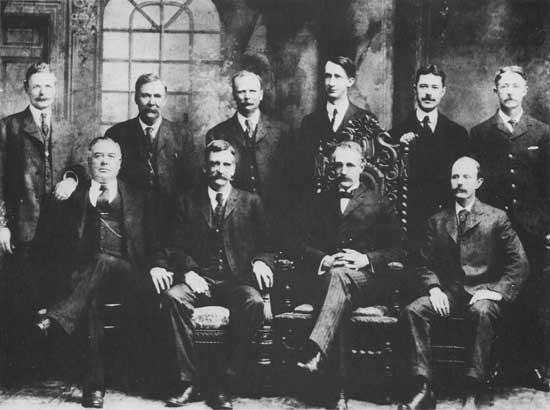|
100 Years of Federal Forestry Agriculture Information Bulletin No. 402 |

|
United States Department of Agriculture Forest Service
Major Activities
|
NATIONAL FOREST SYSTEM Protects and manages 187.5 million acres:183.0 million acres National Forests 3.8 million acres National Grasslands 443,547 acres of Land Utilization Projects, Purchase Units, Research and Experimental Areas, and others. On these lands are: More than 3.7 million big game animals. 217.4 million cu. ft. of standing timber (1970). 39 endangered wildlife species. Fiscal Year 1975 Income: $373 million from National Forests as follows: $341.3 million from timber sales $7.7 million from grazing fees $12.4 million from mineral receipts $9.7 million from recreation admission and user fees $.5 million from power $1.4 million from land use fees In Fiscal Year 1976: $89.7 million was returned to States In Fiscal Year 1975: 9.2 billion bd. ft. timber harvested (under strict regulation) 13.6 billion bd. ft. allowable annual cut 1.4 million cattle grazed l.5 million sheep grazed 578 million forest and windbarrier planting stock distributed, under cooperative programs 292,954 acres planted and seeded 68,727 acres of natural regeneration 454,496 acres of stand improvement 113.6 million tree seedlings produced in Federal nurseries 199 million visitor days recreational use (calendar year 1975) 13,713 miles of road constructed and reconstructed 6,843.5 miles of road constructed and reconstructed by timber purchasers 127,368 woodland owners assisted, affecting 10.4 million acres;.7 million bd. ft. of timber products harvested 10,804 fires promptly controlled on lands protected by Forest Service (calendar year 1975) 133,198 acres burned (calendar year 1975)
19 National Grasslands* 16 Land Utilization Projects* 11 Nurseries* 669 Ranger Districts* 17 Job Corps Centers * Administered by 121 Forest Supervisors |
RESEARCH Through Science ProducesKnowledge and Technology for Managing Resources Timber Water Range Wildlife Habitat Recreation Protecting Resources Fire Insect Disease Pollution Utilizing Wood Resources Wood Products Marketing Engineering Systems Plus Resource Surveys and Related Economics 8 Forest and Range Experiment Stations l Forest Products Laboratory l Institute of Tropical Forestry 80 Other Research Locations 94 Experimental Forests and Ranges 119 Research Natural Areas 340 Research Projects 3,700 Individual Studies 1,112 Scientists 1,300 Publications Annually |
COOPERATION WithStare and Private Owners on 393 Million Acres To Meet the Needs of an Expanding Population Though Providing Protection Reforestation (1.6 Million Acres in 1975) Increasing Forest Yields Utilizing Forest Products Reducing Wood Waste Conserving Soil and Water Providing Forest Recreation Enhancing Natural Beauty Increasing Fish and Wildlife 2 Areas and 7 Regions Cooperation with 50 Stares, Puerto Rico, Guam, and the Virgin Islands Public Agencies, Community Development Organizations, and Forest Industry |
(click to see the original copy of this chart in PDF format)

|
|
Committee appointed in the fall of 1905, at the direction of Chief
Forester Gifford Pinchot, to revise the USDA Use Book, the first Forest
Service manual for the operation of the Forest Reserves. Back row, left to right. Forest Ranger B. H. Crow, Angeles National Forest, California; Forest Supervisor Daniel Marshall, Uintah National Forest, Utah; Forest Supervisor R. E. Miller, Teton National Forest, Wyoming; Forest Supervisor Edward A. Sherman, Bitterroot National Forest, Montana; Forest Ranger Leon F. Kneipp, Pecos National Forest, New Mexico; Forest Ranger Edward S. Mainwaring, Sierra National Forest, California. Front row, left to right. Forest Ranger Rufus King Wade, Gila National Forest, Arizona; Forest Supervisor Seth Bullock, Black Hills National Forest, South Dakota; Chief Forester Gifford Pinchot; Assistant Chief Forester Albert F. Potter. (F—242311) |
| <<< Previous | <<< Contents>>> |
aib-402/sec8.htm
Last Updated: 12-May-2008